transparency report
Latest
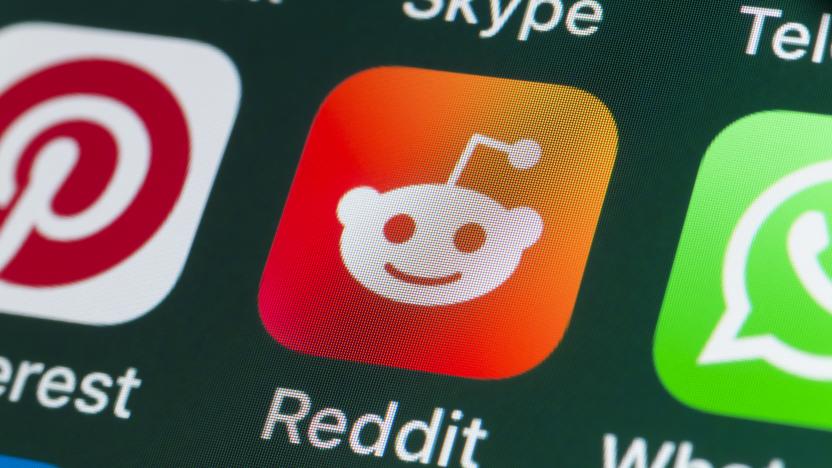
Reddit says it's banning more people than ever in big transparency push
Reddit has introduced a transparency center serving as a hub for safety, security and policy information.
Steve Dent03.30.2023
Twitter reports record number of takedown requests from governments
Twitter published its latest transparency report.
Mariella Moon01.26.2022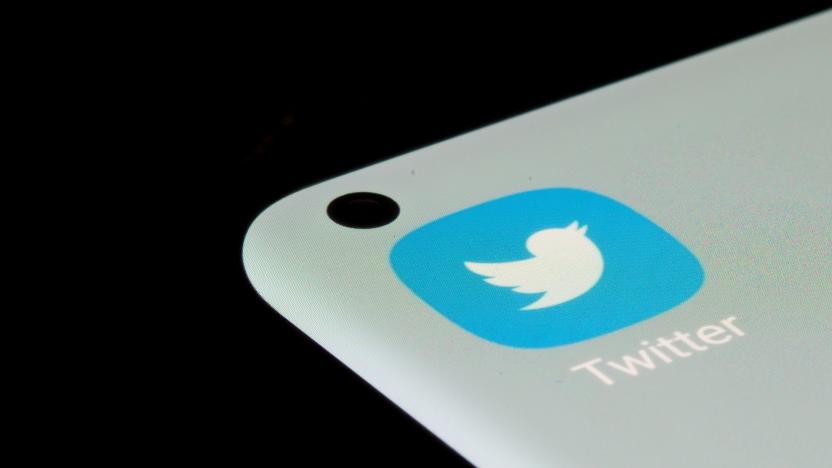
Twitter removed a lot more abusive content in the second half of 2020 than ever before
Twitter is getting better at moderating its platform. That’s one of the main takeaways from the company’s most recent transparency report.
Igor Bonifacic07.15.2021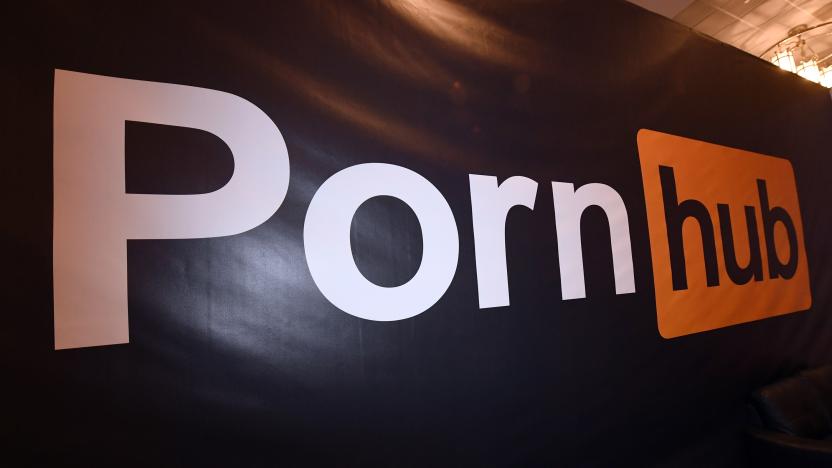
Pornhub's first transparency report details how it addresses illegal content
Pornhub has published its first ever transparency report that sheds light on its content moderation practices and reports its received from January 2020 to December 2020.
Mariella Moon04.04.2021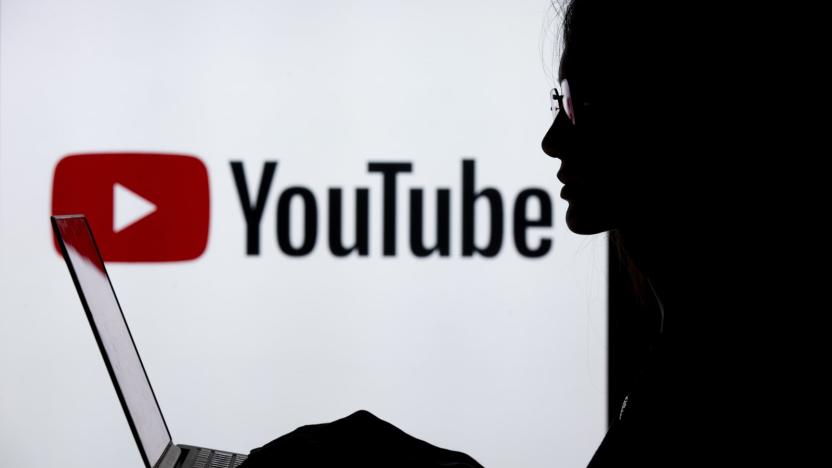
YouTube’s appeal process is largely ineffective
YouTube's latest transparency report suggests its appeals process is failing creators. Last quarter, YouTube removed 5.9 million videos from the platform. It received just 108,779 appeals, but it only reinstated 23,471 of those videos. That means roughly 78 percent of appeals were rejected.
Christine Fisher02.29.2020
TikTok report says China didn't request user info in the first half of 2019
In its first-ever transparency report, TikTok claims it didn't receive any user information requests from the Chinese government in the first half of 2019. Instead, the majority of both legal and government-related requests came from India. In all, TikTok says it fielded 107 legal requests related to 143 Indian accounts, and provided authorities with user information in 47 percent of cases.
Igor Bonifacic01.03.2020
Google's 2020 transparency reports will include enterprise data requests
Google's twice-per-year transparency reports are about to feature more details on government snooping. At the start of next year, the company says it will include a section in the documents that details the number of enterprise Google Cloud and GSuite data requests the company has fielded from governments.
Igor Bonifacic10.25.2019
Apple reveals how often governments request App Store takedowns
The latest transparency report from Cupertino comes with a couple of sections its previous ones didn't have -- ones that reveal how many takedown requests it received. Apparently, Apple received 80 App Store takedown requests for legal violations in the second half of 2018, from July to December. A total of 770 applications were specified in the requests, 626 of which came from the Chinese government. The vast majority of the apps China wanted to remove violate the country's illegal gambling and pornography laws.
Mariella Moon07.03.2019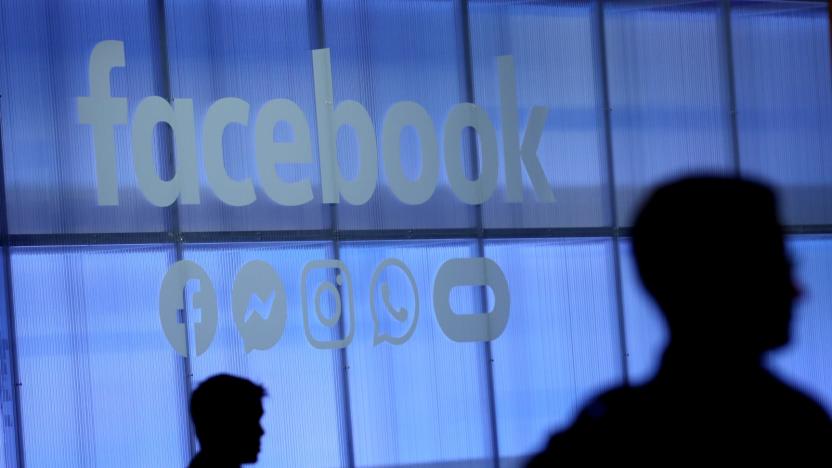
Facebook has taken down over 2 billion fake accounts in 2019
Facebook took down 2.19 billion fake accounts during the first quarter of 2019, the company has announced. In addition to that, Facebook said it disabled 1.2 billion fake accounts in Q4 2018. These numbers are quite staggering when you consider that Facebook has 2.38 billion monthly active users, as reported in its Q1 2019 earnings. "For fake accounts," Facebook said in a blog post, "the amount of accounts we took action on increased due to automated attacks by bad actors who attempt to create large volumes of accounts at one time."
Edgar Alvarez05.24.2019
Twitter suspensions for promoting terrorism drop yet again
Twitter has released its latest transparency report, covering July-December 2018. During that time, it suspended 166,513 accounts for promoting terrorism. It said 91 percent of them were identified by internal systems, and the figure is 19 percent lower than in the previous six months. The company suggested there's a steady decrease in terrorist groups trying to use the platform, party due to its "zero-tolerance policy enforcement." It noted that, in most cases, it takes action against these accounts while people are setting them up and before they ever post a tweet.
Kris Holt05.09.2019
Warrantless searches of Americans’ data spiked 28 percent in 2018
An annual transparency report published by the Office of the Director of National Intelligence shows warrantless searches of Americans' data jumped 28 percent in 2018. According to the report, the National Security Agency (NSA) conducted 9,637 warrantless search queries of Americans' calls, texts, and emails in 2018. That's up from 7,512 searches in 2017, and it's more than double the 4,672 warrantless searches the NSA made in 2015.
Christine Fisher05.01.2019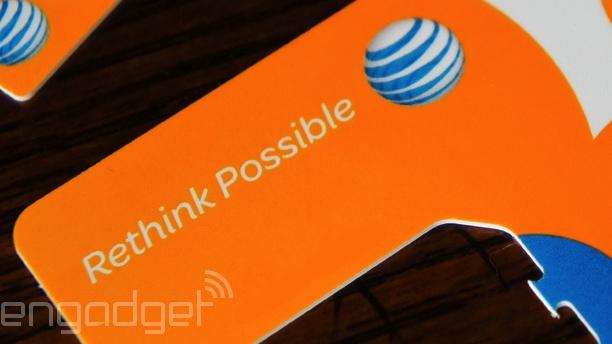
AT&T and Verizon received one government data request per minute last year
Companies including Apple, Facebook and Google recently updated their privacy policies to disclose all government data requests to the individual users in question, a move meant to appease web denizens worldwide. While US telecoms like AT&T and Verizon haven't announced plans to do the same, the Washington Post pored through the companies' transparency reports to turn up a new stat. According to the publication, in 2013 AT&T and Verizon received more than one request every 60 seconds. This number is based on AT&T's reported 301,816 requests from state, local and federal authorities, and Verizon's reported 321,545 requests.
Sarah Silbert05.06.2014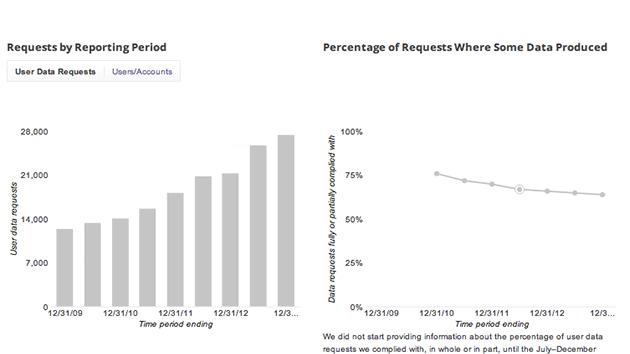
Google transparency report: government requests up 120 percent since 2009
Google's been publishing transparency reports since 2009, but its disclosure of government requests has become especially interesting in the aftermath of revelations about PRISM and NSA surveillance. The company's ninth report, released today, details a significant jump in requests for user information. Since the first report, the volume of government requests has increased by about 120 percent. Meanwhile, the percentage of requests where Google actually supplied user information has decreased slightly, to 64 percent in 2013 versus 76 percent three years earlier. Google also notes that, as its number of users increases, so does the number of governments that exercise their authority to request information. In response, Mountain View's transparency reports now include countries that make less than 30 requests during a period in addition to those that make 30-plus requests. Among the former group, you'll find entries such as Bulgaria, Lichtenstein and even Vatican City, all three of which made only one request for user data between July to December 2013. Finally, Google's responded to users' questions about its response to search warrants with a live-action animation. Check it out below.
Sarah Silbert03.27.2014
Google Transparency Report: government takedown requests are on the rise
Google's Transparency Reports shed light on how often governments across the globe request the removal of content, and the company's latest is especially interesting given the intense focus on the NSA's data-snooping policies and the government(s) behind them. You see, it appears that countries don't like coming under scrutiny online -- how else could you explain the 68-percent increase in removal requests in the first half of 2013 compared to the second half of 2012? That number comes courtesy of Google's latest report, its eighth since the first was released in 2010. Unsurprisingly, much of the content targeted for takedown is political in nature: Google says governments continually want to scrape unflattering coverage, from video footage that reflects badly on police departments to criticism of judges. Both Russia and Turkey, in particular, increased their removal requests in the first half of the year, both in response to online criticism of national laws. Mountain View hasn't rolled over completely, though; it says it removed less than one third of content targeted in these requests. There's plenty of other data to dig through, if you're interested -- check out the source link below.
Sarah Silbert12.20.2013
Yahoo issues first transparency report, replete with governmental data requests
Following in the footsteps of Facebook -- which revealed its first Global Government Requests Report just a few weeks ago -- Yahoo is finishing out the week by publishing data of its own. The firm's first "global law enforcement transparency report" covers governmental requests for user data from January 1st through June 30th of this year, and the outfit plans to put out subsequent reports every six months. Of note, Yahoo claims that it's including "national security requests within the scope of [its] aggregate statistics," and for the paranoid in attendance, you may be relieved to know that said requests comprise "less than one one-hundredth of one percent (<.01%)" of Yahoo's global userbase. Feel free to dig in at the links below, but sadly, you won't find anything other than high-level macro figures. (As an aside, that logo.)
Darren Murph09.07.2013
Google's latest transparency report reveals 88 percent of US information requests are complied with
When Google receives government requests for personal data, does it spit in the G-Man's face or invite him in for tea and crumpets? The search giant's transparency report reveals that, 88 percent of the time, the US will be able to rifle through your emails while eating baked goods. The States tops the chart, demanding Mountain View release information on 14,791 users in the last three months -- with 3,152 requested with a search warrant, 10,390 with a subpoena and 1,249 from processes including EDPA court orders. The list of the top five nosiest countries is rounded out by India, France, Germany and the UK. Tour the report and you may notice that, breaking with tradition, content takedowns are no longer mentioned -- Google is planning to break out that data as a separate filing in the future.
Daniel Cooper01.24.2013
Twitter Transparency Report shows DMCA and government actions: US is biggest busybody
Twitter dispatched its first biannual Transparency Report -- revealing government requests for user info and content holdback along with DMCA takedown notices -- which spotlights the US as the most active by far. The company claimed it was aroused to action by Google, which has been doing it for the last two years and recently added copyright takedowns to its own reports. So far, Twitter says that while most nations requested user data 10 times or fewer, the US government made 679 such appeals, more than the entire rest of the world combined. It also showed how often it obeyed -- 75 percent of the time in the US; much less elsewhere -- and said that affected users are always notified unless the company is prohibited from doing so. As we also noted with Google's reports, DMCA takedowns were by far the most numerous requests, with 3,378 total affecting 5,874 users, and 599 offending items actually pulled (38 percent). Those appeals aren't broken down by company like Mountain View's, but if you think that Usher photo mashup you're using as an avatar might be a problem, check the source to see all the data.
Steve Dent07.03.2012
Google reveals government censorship requests are on the rise
Google's updated its transparency report to show how many times governments worldwide sought to censor search results, drop YouTube videos or look at user data in the second half of last year. Each request is logged and detailed, with the most filings coming from the US, UK and India. The requests varied from censoring a video where a Canadian citizen creatively destroyed his passport (not complied with) through to blogs promoting hate speech and violence (complied with). Mountain View's list makes for interesting reading, but it's not all bad news: where videos were merely critical or satirical of the local authorities, the search giant refused to pull 'em, respecting private citizens right to free speech in a great majority of cases.
Daniel Cooper06.18.2012